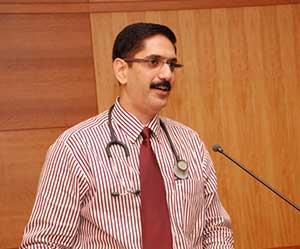'It is important for all of us to understand to have 1. COVID-19-appropriate behaviour, even after vaccination and 2. to try to increase the vaccination drive.'

"Our positivity rate is between nine and 11 per cent. One month ago, it was almost 17 per cent."
"We've achieved a mortality now of around 2 per cent, from nine to 10 per cent, when we began."
These vital numbers are tendered by intensivist Dr Khusrav Bajan.
Dr Bajan is part of the Maharashtra medical task force, that advises Chief Minister Uddhav Thackeray and his team on how to steer a safe course for the state in these treacherous pandemic times.
The emergency care and critical care physician, who is attached to the P D Hinduja Hospital, north central Mumbai, says that the state government and the people's efforts to control the numbers of COVID-19 fresh cases are now slowly showing results, but it will still take a little longer for mortality rates to reflect that.
He offers advice on vaccination schedules and how to recognise the severity of your COVID-19 symptoms in Part II of an interview to Vaihayasi Pande Daniel/Rediff.com.

Again about the variant, because we don't do vigorous sequencing of the variants, so as a doctor, hands on, seeing the patients, how do you know what variant it is. I hear the UK variant is quite prevalent in north India, and Delhi.
So, the UK variant is now very dusted and done.
We are not even worried about that.
We are a little more worried about the South African and the Brazilian variant, because the mortality is higher with that. But we are not seeing that trend here.
It is important for all of us to understand to have 1. COVID-19-appropriate behaviour, even after vaccination and 2. to try to increase the vaccination drive.
These are the two things that would help us to prevent the third wave.

So not worry about what variety of COVID-19 virus it is and where it's coming from?
I don't think that is a big issue, yes.
We have started doing genomics about five months ago. And now we are testing more and more samples to understand the value of those double and triple mutants, whether they are coming from UK or South Africa or California or elsewhere. And we are also studying the effect of the vaccines on the mutants.
That is more of an epidemiological thing. And we need data on that, which will evolve in the next two months.
But as of now, we need -- I am again reiterating the same thing -- we need COVID-19-appropriate behaviour even after vaccination.

Let me clarify once more: You're saying the damage of the second wave situation, even with respect to young people, is not necessarily the effect of variants or any of the two Indian variants which you mentioned. Basically, we don't know -- it's a gray area.
Yes.
We know that they are variants. They have been identified.
We don't know whether the current change in demographics in the direction of young people (being affected) is because of this or because of the more non-COVID-19-appropriate behavior happened in the six months of unlocking.

The COVID-19 situation, for instance, by contrast, in Uttar Pradesh doesn't seem in control. But in Maharashtra it's a completely different situation.
We are very transparent. We are very glad that we have given all our numbers appropriately.
And it's not only the numbers, which are declining, now, with all the efforts, but we, always, along with numbers, give the positivity ratio, how many deaths were there.
On days, when we do lesser deaths, maybe the numbers are more, but we also give those numbers.
So, in Maharashtra, we are very lucky that we have very transparent numbers.
Secondly, it's not only the numbers, but it's the positivity ratio. If you're testing less, you will have lesser numbers. We have increased our testing to almost 40,000 a day.
And out of the 40,000, we are having about 4,000 or less than 3,000 positives, currently. Our positivity rate is between nine and 11 per cent.
One month ago, it was almost 17 per cent.

But the question I was going to ask is, one can see that Mumbai is doing better, Maharashtra is doing better. It's been doing better for now almost two to three weeks.
But there's always the anecdotal evidence. There are so many people one knows who are dying.
Though Mumbai and Maharashtra are doing better, it will still take another two weeks or so to stop people from dying?
Yes, so you're right.
There is increase in the mortality. And whenever cases rise, the mortality will be higher two weeks later and not immediately. Those patients, who were admitted two weeks ago, would probably add on to the mortality for the next two weeks.
But after that, we will see even the mortality reducing.
 IMAGE: Dr Khusrav Bajan. Photograph: Kind courtesy Dr Khusrav Bajan
IMAGE: Dr Khusrav Bajan. Photograph: Kind courtesy Dr Khusrav BajanHaving said that, we've achieved a mortality now of around 2 per cent, from nine to 10 per cent, when we began (at the start of the second wave).

A Mumbai-related question, that's being asked and I know the answer, but I would like your confirmation: People are asking why is it happening to 'us'?
It was predicted by many doctors last year -- that it will come to the high rises later. It's happening to 'us', because it's coming to the high rises now and also because of COVID-19-inappropriate behaviour, correct?
Yes, absolutely.
We have seen more and more middle-class and upper-class people getting affected, more than even the slums and Dharavi etc, where we've actually had a win situation.
This is all boiling down to COVID-19-inappropriate behaviour.
- PART III: 'I would advise vaccination all the way'
Feature Presentation: Ashish Narsale/ Rediff.com









